Trump admin plans 50% cut to State Department funding - NYT
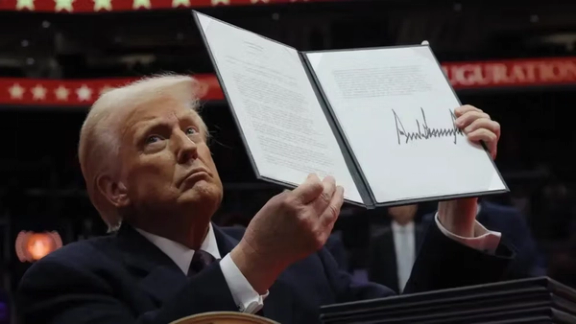
The Trump administration is considering a proposal to cut nearly 50 percent of the State Department's funding for the upcoming fiscal year, The New York Times reported.

The Trump administration is considering a proposal to cut nearly 50 percent of the State Department's funding for the upcoming fiscal year, The New York Times reported.
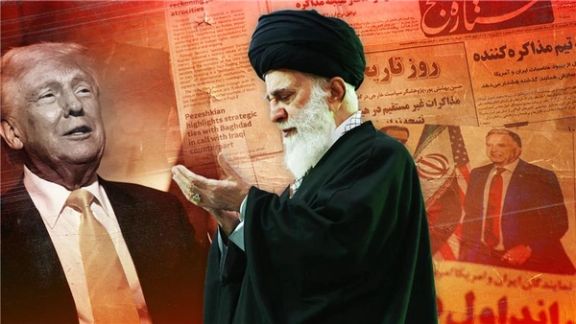
The divide among Iran's ultraconservatives began at least a month before the latest round of Iran-US talks, but it has since escalated into an open rift, with most hardliners now backing away from their earlier opposition to negotiations.
Even before the talks resumed, Mahmood Nabavian, vice chairman of the Iranian parliament’s National Security Committee, had begun taking positions that diverged from the hardline Paydari Party’s stance on both domestic and foreign policy.
As recently as last week, hardliners in the Iranian parliament (Majles) and Friday Prayer imams continued to insist that Supreme Leader Ali Khamenei opposed any negotiations with the United States. They maintained that there was no possibility of Iran engaging in talks with anyone from the Trump administration.
That changed on Saturday, April 12, when Foreign Minister Abbas Araghchi met with Trump’s special envoy for the Middle East, Steve Witkoff, in Oman. By Monday, it became clear that the meeting had been more substantial than initially disclosed—despite Araghchi’s earlier statements, the two officials had held a face-to-face meeting lasting about 45 minutes.
Iranian hardliners had expected Khamenei to react—perhaps with public disapproval or at least a symbolic rebuke of his foreign minister. But instead, the Supreme Leader remained silent.
At the Majles, ultraconservative lawmaker Hamid Rasaei declared, in a less than happy tone, that the talks had taken place with Khamenei’s full endorsement. Hossein Shariatmadari, editor of the hardline daily Kayhan, echoed the sentiment, insisting the meeting would not have occurred without the Supreme Leader’s explicit approval.
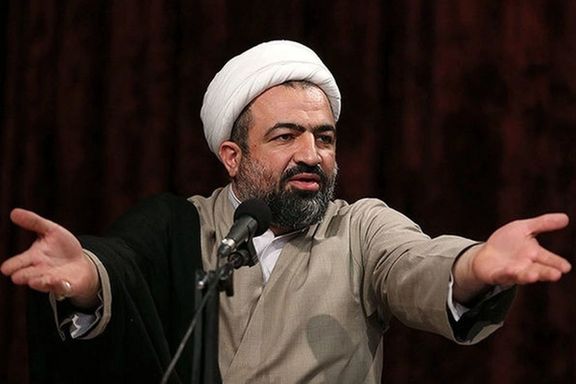
This left the ultraconservatives with little ground to stand on regarding the negotiations. Still, pockets of resistance remained in the Majles. Outspoken hardliner Mehdi Kouchakzadeh shouted that the legislature had been kept in the dark about the talks. Speaker Mohammad Bagher Ghalibaf quickly cut him off, insisting that the Majles was fully informed. Other lawmakers looked on in silence, their expressions unreadable.
Some hardliners such as Nabavian supported the talks as something that was backed by Khamenei but lambasted Araghchi for meeting with Witkoff breaking his promise of not holding direct talks.
On Monday, the moderate conservative website Khabar Online and the reformist, pro-Pezeshkian daily Etemad published detailed reports on the ultraconservatives’ anger over the negotiations, highlighting what they described as a new rift within Iran’s hardline camp.
Khabar Online reported that the ultraconservatives have fractured into several factions. Some figures, it noted, were so enraged that their public remarks included direct insults toward the negotiators. Meanwhile, other conservatives such as Naghavi Hosseini, along with centrists like Mansoor Haghighatpour, criticized the hardliners opposing the talks, branding them "infiltrators who seek to polarize Iranian society."
Abbas Amirifar, a cleric close to former President Mahmoud Ahmadinejad, accused the ultraconservatives of dishonesty, saying they only pretend to be obedient to Supreme Leader Ali Khamenei. Former lawmaker Gholamali Imanabadi went further, calling them "traitors." From the reformist camp, cleric Mohsen Rohami claimed, "If there were a referendum on negotiating with America, 98 percent of Iranians would vote in favor of the talks."
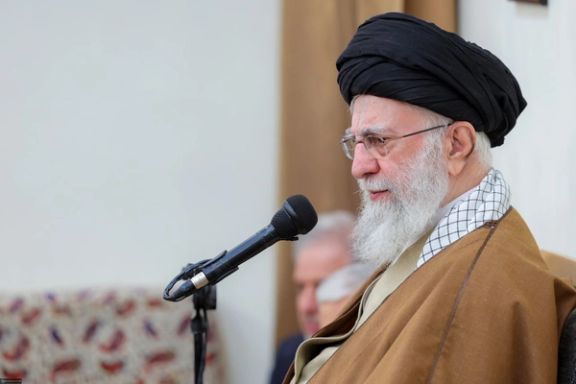
Khabar Online revealed that many prominent conservatives have repeatedly expressed their support for negotiations with the United States. Even Ali Khezrian, a staunch supporter of Paydari Party at the Majles has defended the negotiations saying that "America has been weakened under Tump and it is now time to negotiate with it."
Others like hardline cleric Mojtaba Zolnouri who had set fire to copies of the 2015 nuclear agreement at the Majles have also supported the talks. Zolnouri said: "We live under the shadow of the Supreme Leader. We will accept whatever he wants."
Curiously, one prominent ultraconservative figure—former nuclear negotiator Saeed Jalili—has remained conspicuously silent on the ongoing talks. He has not commented on the negotiations themselves, nor on the exchange of letters between Trump and Khamenei that preceded them.
Some Iranian media outlets speculate that Jalili may be mobilizing his "infantry"—a reference to the vigilante groups often active in Tehran and other cities—for a potential street campaign. Another theory circulating among reporters in Tehran is that Jalili is confident the current round of talks will ultimately fail. A third possibility is that he has been instructed by authorities to stay silent for now.
Nonetheless, Jalili still wields influence. His brother Vahid oversees state television, which has maintained its anti-US tone despite the launch of formal negotiations. Media analysts note that state TV continues to give airtime to commentators openly opposed to the talks and to US policy in the region.
A real shift in Khamenei’s stance on negotiations, some observers argue, would only be evident if state television—and Tehran’s hardline newspapers—begin to change their messaging.
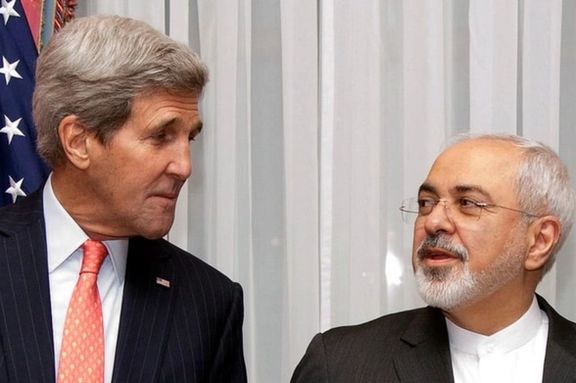
In a scathing response to an op-ed article by former US Secretary of State John Kerry, Iran's hardline Kayhan daily dismissed his assertion that Tehran is backed into a corner due to recent developments.
Kayhan’s editorial, responding to a Wall Street Journal op-ed by John Kerry and Thomas Kaplan that suggested President Donald Trump now has an opportunity for a broader nuclear deal with Iran due to Tehran’s weakened regional position, dismissed the analysis as based on false premises and a fundamental misunderstanding of Iran’s strengths.
Tehran has seen its regional influence weakened, with Hamas, Hezbollah, and the Houthis under increasing pressure, and Bashar al-Assad no longer in power in Syria.
"Mr. Kerry, although you still seem to dream of leading the world, there is ample and undeniable evidence that today’s America is no longer the powerful nation it once was," Kayhan wrote. "How can a country whose president speaks of hardship, whose senators describe this as the worst period in its history, and whose people stand in line for food and shelter, expect to pressure others?"
In contrast to Kerry's portrayal of Iran's weakened hand, Kayhan argued that the Islamic Republic is in the center of regional and global developments and continues its path with "authority and dignity."
Kerry's original article had argued that "Ten years after the last nuclear agreement with Iran, the balance of forces has changed dramatically... Iran, often a master of miscalculation and geopolitical malpractice, has backed itself into a corner, and that paradoxically boosts the odds for a peace initiative." He also called on President Trump to seek a deal that "prevents Iran from ever possessing a potentially lethal nuclear program."
"So Mr. Kerry! Accept the reality: It is not Iran that is in the corner of the ring; it is America that is counting down," Kayhan editorial read.
Also on Tuesday, Tasnim News Agency, a media outlet affiliated with the Revolutionary Guards, analyzed the reasons behind Supreme Leader Ali Khamenei's approval of indirect negotiations with the United States.
The author, Mehdi Khodaei, refuted three common interpretations for this decision: that it was due to Trump's threats, that Iran had no other choice, or that it was imposed upon Khamenei by the government or other high-ranking officials.
It argued that Iran's willingness to engage in indirect talks is not out of fear or frustration, as Iran possesses the capability to respond and doubts the US would initiate a conflict.
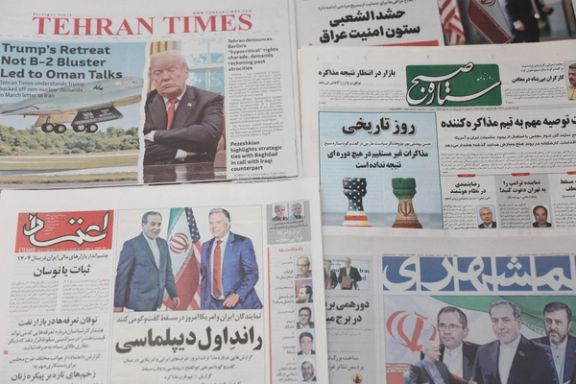
US envoy Steve Witkoff, who on Monday appeared to signal that Washington might tolerate limited uranium enrichment by Iran, clarified in a Tuesday tweet that Tehran "must stop and eliminate its nuclear enrichment and weaponization program."
Witkoff’s remarks on Monday suggested that any new deal could closely resemble the Obama-era JCPOA, which President Donald Trump withdrew from in 2018.
In a tweet on Tuesday Witkoff seemed to have backtracked from his earlier statement.
“A deal with Iran will only be completed if it is a Trump deal," the special envoy said and added, "...meaning that Iran must stop and eliminate its nuclear enrichment and weaponization program."
On Monday, Witkoff had said in an interview with Fox News’ Hannity that Iran's uranium enrichment would not be eliminated entirely but rather scaled back to the JCPOA’s limit of 3.67 percent. “They do not need to enrich past 3.67 percent,” he said.
Ha also added that “This is going to be much about verification on the enrichment program, and then ultimately verification on weaponization. That includes missiles—the type of missiles that they have stockpiled there—and it includes the trigger for a bomb.”
This particular demand would be within reach, as Tehran has repeatedly has called for a US return to the original terms of the JCPOA.
So what was new in Witkoff’s remarks in his interview with Fox?
First, the Trump administration is seeking a broader inspection regime than the one included in the JCPOA. This could entail access not only to declared enrichment facilities, but also to potential sites involved in warhead development. Iran has consistently resisted such expanded oversight, and this will likely be a point of friction in the talks.
Second, Witkoff explicitly mentioned Iran’s ballistic missile program—a domain left mostly untouched by the original nuclear deal. Including missile oversight would require access to Iran’s extensive military research and development infrastructure, which Tehran has long refused to open to outside inspection.
The logic for including missiles is clear. If Iran were to produce nuclear warheads, ballistic missiles would be its most viable delivery system. Iran has already built thousands of such missiles. While they may not be highly advanced, when armed with nuclear warheads, they could pose a significant threat to the region, including Israel, Greece, and potentially other parts of southern and eastern Europe.
Witkoff had hinted at the administration’s limited goals in an earlier interview with Tucker Carlson in March. However, other senior officials, including the Secretary of State and the National Security Adviser, have publicly pushed for the complete dismantling of Iran’s nuclear program.
One unresolved issue is also the fate of nearly 300 kilograms of highly enriched uranium that Iran has stockpiled. According to a report by The Guardian on Tuesday, the United States has proposed transferring the material to a third country, such as Russia—a move Tehran is likely to oppose. The issue was reportedly raised during recent talks in Oman between Foreign Minister Abbas Araghchi and Witkoff, but Iran insisted the stockpile remain under UN supervision inside the country..
Ultimately, the central question is how quickly and how far Tehran is prepared to go in reaching a deal, specially if the US insists on zero enrichment—and whether the Trump administration is willing to compromise on its tougher demands during the bargaining process.
"Iran has to get rid of the concept of a nuclear weapon. They cannot have a nuclear weapon," President Trump said on April 14. "I think they're tapping us along because they were so used to dealing with stupid people in this country."
“They've got to go fast, because they're fairly close to having one, and they're not going to have one,” he added. “If we have to do something very harsh, we'll do it. And I'm not doing it for us, I'm doing it for the world. These are radicalized people, and they cannot have a nuclear weapon.”
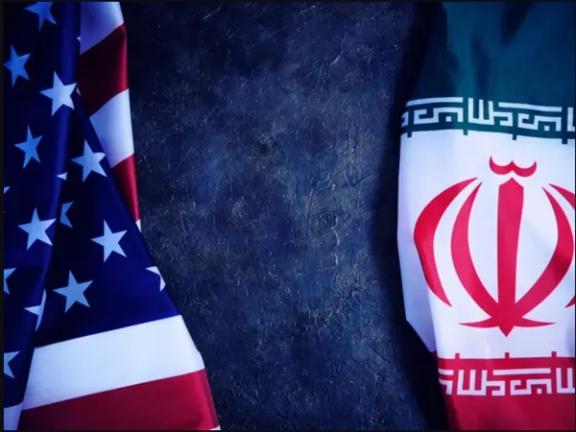
The first thing Iranian Foreign Minister Abbas Araghchi probably noticed upon returning to Tehran from Oman—where he met with US Special Envoy Steve Wikoff—was the appearance of his own oversized images on billboards across the capital’s expressways.
Hardliners in Tehran have been working to frame the opaque, closed-door meeting—described as positive by both sides—as a political win for the Islamic Republic. Some have even gone so far as to label it a victory.
The following day, Javan, the IRGC-affiliated daily, declared: "Iran is the winner of the negotiations, with or without an agreement." The paper described the meeting as "a show of Iran's power against the United States' helplessness."
Javan highlighted the breaking of the deadlock and the promise of further negotiations as signs the process would ultimately benefit Iran. It claimed Iran had dictated "all of its preconditions, including the venue, timing, and agenda" to the United States.
This triumphant narrative, however, stood in contrast to Araghchi’s own statement that the talks focused solely on nuclear issues. Meanwhile, Reuters reported that the negotiations aimed to "de-escalate regional tensions, facilitate prisoner exchanges, and reach limited agreements to ease sanctions in exchange for controlling Iran's nuclear program."
At the same time, some hardliners sought to emphasize Supreme Leader Ali Khamenei’s authority by noting that he had personally authorized the meeting.
However some opposition to negotiations was evident among ultra-hardliners. They appeared to highlight Khamenei's role with the possible intent of assigning blame to him should the renewed diplomatic engagement fail.
Hossein Shariatmadari, editor of the Khamenei-linked Kayhan newspaper, wrote: "The indirect talks with the United States could not have taken place without Khamenei's permission. If he had not approved them, he would certainly have blocked the meeting."
Shariatmadari added: "The horizon is not clear, and Iran must think of a Plan B." He dismissed US threats of military action as "a bluff," and claimed that "the draft Witkoff handed to Araghchi included no such thing as dismantling Iran's nuclear establishments or the possibility of a military attack."
Outspoken ultra-hardliner lawmaker Hamid Rasaei said in parliament on Sunday morning: "We all know that the Supreme Leader believes that the United States is not trustworthy and that negotiations with Washington are useless." He added, however, that "The Leader has authorized the talks to prove to some Iranian officials that the US breaks its promises and will put forward illogical demands."
Meanwhile, another ultraconservative MP, Mahmood Nabavian, vice-chairman of the Iranian parliament's national security committee, claimed that Trump initially wanted US Secretary of State Marco Rubio to participate in the talks with Araghchi. "But we insisted that Witkoff should go to Oman instead," he said, adding: "Trump accepted all of Iran's conditions regarding the format of the talks."
Saeed Haddadian, a political aide to parliament speaker Mohammad Bagher Ghalibaf, also warned against excessive optimism about the negotiations with Washington. He suggested that Trump might not even support the approach taken by his own special envoy.
"If you show weakness in front of a thug such as Trump," Haddadian said, "you are likely to end up like Ukrainian President Zelensky. You will be humiliated, and you will not get any results."
In a separate development, Mehdi Fazaeli, a member of the Supreme Leader's office staff, denied claims that senior Iranian officials had pressured Khamenei to shift his position in response to Trump’s letter or to adjust his overall approach to the talks.
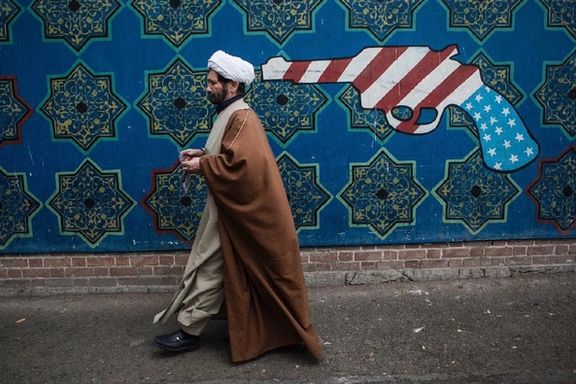
The apparent swift progress of talks between the United States and Tehran has caused some observers to wonder whether Washington's former embassy, the emblem of their original bitter rift, may be reinstated in the event of success.
Early on Sunday, dissident lawyer and civil activist Hassan Younesi posted on X that he had heard “some groups and organizations stationed at the embassy building … have been ordered to evacuate it.” The post quickly drew attention, partly because Younesi’s father, Ali Younesi, served as intelligence minister under reformist President Mohammad Khatami.
Hours later, however, Younesi deleted the post and published a follow-up, saying he had been contacted by what he called “responsible authorities” who denied the reports and said his post had created the mistaken impression that preliminary steps were being taken to prepare the embassy for a handover.
Such deletions by political activists and media figures—often under pressure from security agencies—are not uncommon in Iran.
Some users suggested that a potential handover could pave the way for American investments in Iran, especially after President Masoud Pezeshkian commented recently that Supreme Leader Ali Khamenei had “no objection” to American investors entering the Iranian market.
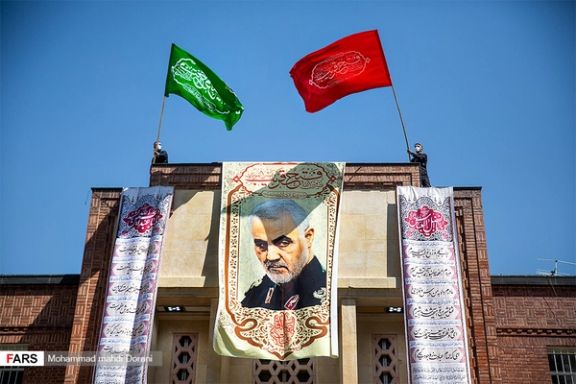
“Why would Trump push for direct talks unless it’s about reopening the embassy?” one user posted. “How else can US companies invest here?”
Former Israeli official and spokesperson Ben Sabeti also weighed in on X: “Iran makes cheap gestures toward @POTUS for the success of negotiations? There are reports about the US Embassy in Tehran being vacated for the first time since 1979. Is the regime also ready to make nuclear concessions?”
Meanwhile, Iranian media—highly constrained by censorship—picked up Younesi’s now-deleted post, but offered minimal commentary. “If true, this is a very meaningful step,” read a brief article titled What’s the story of the evacuation of the US Embassy building? published by Rouydad24 on Sunday. Fararu, another popular online outlet, published a gallery of recent photos showing foreign tourists visiting the former embassy, under the headline US Embassy in Tehran Draws Attention Again on Day of Talks—without offering any further remarks.
The US embassy takeover forty-six years ago
Islamist students occupied the embassy in November 1979. The students held tens of American diplomats and other staff hostage for 444 days. The embassy compound, which the students called “Den of Spies”, however, has been used as a base by IRGC-affiliated groups, including the Basij militia and its affiliated Daneshjoo (Student) News Agency.
Other parts of the building were converted into a museum and opened to the public in recent years. The Swiss embassy has represented US interests in Iran in the past forty-six years.
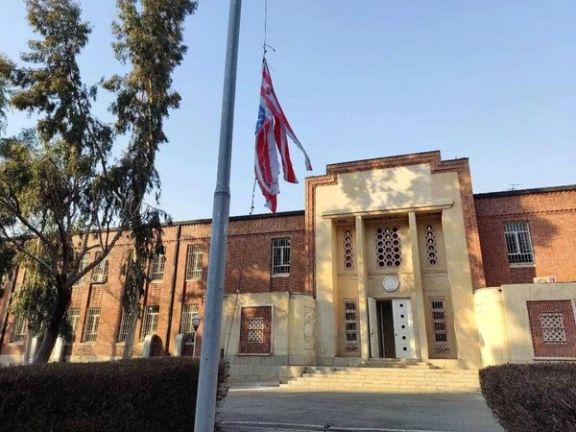
Calls for normalization of relations and re-opening of the embassy
In recent years, various Iranian political and media figures have supported the idea of restoring diplomatic ties with the United States and returning the embassy building after decades of occupation.
Most recently, reformist politician and cleric Mohsen Rohami suggested in an interview published by Khabar Online that Iran and the United States could re-open their embassies and that higher officials than foreign ministers could sit at the negotiation table.
“This will have a positive psychological impact, besides its practical outcome, on our society and neighbors,” Khabar Online on Sunday quoted Rohami, who served as the legal deputy of Pezeshkian’s campaign last year, as saying.
Back in August 2024, Mehdi Ghazanfari, head of the National Development Fund, called for the reestablishment of consular relations with the United States. He controversially blamed the Communist Tudeh Party for provoking the 1979 embassy seizure and urged the Pezeshkian administration to act fast before what he called his political rivals' honeymoon with him ended.
His suggestion was echoed by some other politicians and public figures including Mohammad-Hossein Khoshvaght, a former official of the Islamic Guidance Ministry and managing director of Fararu. Khoshvaght has close ties to Khamenei’s household through the marriage of his sister to Khamenei’s eldest son, Mostafa.
Khoshvaght contended that normalization of relations could benefit both countries. "An Iran that has normal relations with the United States is a nightmare for Russia and Israel; for Putin, an Iran with nuclear weapons is less dangerous than an Iran that has normal relations with the United States!" he wrote on X.
In a 2015 interview with The Guardian, Akbar Hashemi Rafsanjani said reopening the embassy was “not impossible” if both sides changed their behavior. Similarly, in a 2014 interview with Swiss TV during the Davos Forum, President Hassan Rouhani said animosity with the United States could eventually turn into friendship.
The report cited an internal memo about a proposal to eliminate almost all funding for international organizations like the United Nations and NATO, ending the budget for supporting international peacekeeping operations and curtailing all of the department’s educational and cultural exchanges, like the Fulbright Program.
It said that it is uncertain whether the drastic cuts proposed in the memo would gain approval in the Republican-controlled Congress.
Among the proposed cuts, the report said, the memo outlines a pay and hiring freeze through fiscal 2026, with exceptions for any hires necessary to oversee foreign aid programs transferred from the US Agency for International Development (USAID), which is being disbanded.
The report added that the memo seeks to reduce foreign aid spending by more than 50 percent of the current budget levels for both the State Department and USAID.
The State Department will request a $28.4 billion budget for fiscal year 2026, $26 billion less than the allocation for fiscal year 2025, according to the memo.
The report said that the Trump administration also plans to claw back some funds for the current fiscal year, seeking to reclaim approximately $20 billion in unspent funds from fiscal year 2025 to return to the Treasury.
The report did not specify whether Iran-related programs were included in the cuts.
Over the years, USAID has been a donor to Iranians in the diaspora to strengthen freedom of speech and free flow of information.
A part of the US funds also covers the expenses of Virtual Private Network (VPN) services which ordinary Iranians used to circumvent the Islamic Republic’s censorship.
Official government figures show Washington is the world's biggest donor of international aid, spending $39 billion in the 2024 fiscal year, out of which $65 million was allocated to funding State Department-administered Near East Regional Democracy (NERD).
The body is the main foreign assistance channel through which the United States has supported civil society and human rights in Iran since 2009, according to the .
The report added that it was not immediately clear if Secretary of State Marco Rubio had endorsed the memo which NYT said was dated April 10.
In late March, Iran International learnt that the US government resumed nearly all Iran-related aid programs that were paused under President Donald Trump’s executive order in January this year.